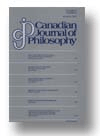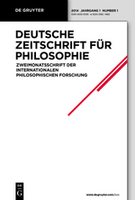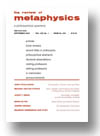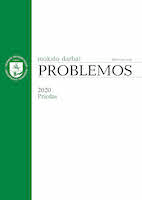
Balkan Journal of Philosophy
Scope & Guideline
Bridging Cultures Through Philosophy
Introduction
Aims and Scopes
- Identity and Selfhood:
The journal explores themes related to personal and collective identities, including narratives, diasporic identities, and the philosophical implications of identity construction. - Ethics and Morality:
Papers often delve into ethical considerations, including care ethics, moral philosophy, and the implications of technology on ethical frameworks. - Interdisciplinary Approaches:
The journal encourages interdisciplinary discourse, integrating insights from psychology, sociology, and technology into philosophical discussions. - Philosophy of Technology:
There is a consistent focus on the philosophical implications of emerging technologies, including artificial intelligence and computational creativity. - Historical and Contemporary Philosophical Analysis:
The journal features analyses of historical philosophical figures and movements, as well as contemporary philosophical challenges, contributing to a deeper understanding of philosophical traditions.
Trending and Emerging
- Post-Truth and Political Critique:
There is an increasing focus on post-truth dynamics and their philosophical implications, particularly concerning politics and technoscience, reflecting contemporary societal concerns. - Environmental Ethics and Identity:
Emerging themes explore the intersection of identity and environmental ethics, indicating a growing interest in how philosophical discussions can address ecological challenges. - Computational Creativity and AI:
The journal is seeing a rise in interest regarding the implications of artificial intelligence on creativity and philosophy, exploring how technology reshapes our understanding of creative processes. - Diasporic and Collective Identities:
Recent papers increasingly address diasporic identities and the philosophical implications of collective narratives, reflecting a broader interest in identity politics and cultural philosophy. - Interculturalism and Global Perspectives:
There is a trend towards exploring intercultural philosophical dialogue, emphasizing the importance of diverse perspectives in understanding contemporary philosophical issues.
Declining or Waning
- Classical Philosophical Traditions:
There has been a noticeable decline in papers focusing on classical philosophical traditions, such as those centered around figures like Hegel and Kant, suggesting a shift towards contemporary issues. - Narrative Frameworks in Traditional Contexts:
Although narratives remain a topic, the traditional frameworks for understanding narratives in philosophy seem to be less frequent, possibly indicating a move towards more innovative or applied approaches. - Political Philosophy in Historical Context:
Papers specifically addressing historical political philosophies, such as those of Rousseau or Constant, appear to be waning, reflecting a shift towards contemporary political discourses.
Similar Journals

Comparative Philosophy-An International Journal of Constructive Engagement of Distinct Approaches toward World Philosophy
Connecting Cultures through Constructive EngagementComparative Philosophy: An International Journal of Constructive Engagement of Distinct Approaches toward World Philosophy, published by SAN JOSE STATE UNIVERSITY, is a leading platform for scholarly dialogue in the realm of philosophical inquiry. With an Open Access format since 2010, the journal seeks to facilitate the exchange of ideas among philosophers across different traditions, thus promoting an enriched understanding of global philosophical perspectives. Designed to cater to the interests of researchers, professionals, and students, the journal emphasizes the constructive engagement of diverse philosophical methodologies, addressing pressing contemporary issues and fostering interdisciplinary discourse. By bridging cultural and ideological divides, Comparative Philosophy plays a pivotal role in advancing philosophical thought and inquiry, making it an invaluable resource for anyone invested in the study of world philosophies.

PHILOSOPHICAL STUDIES
Where Philosophy Meets Rigorous ScholarshipPhilosophical Studies, published by Springer, is a prestigious peer-reviewed journal that stands at the forefront of philosophical discourse since its inception in 1950. With ISSN 0031-8116 and E-ISSN 1573-0883, this journal has firmly established itself as a critical platform for disseminating high-quality research in philosophy, positioned in the Q1 category for Philosophy with an impressive Scopus rank of #73 out of 806, placing it in the 90th percentile of its field. Although it does not offer Open Access, the journal’s rigorous selection process ensures that only the most relevant and impactful studies are published, making it an invaluable resource for philosophers, academics, and students alike. With a commitment to advancing philosophical inquiry and fostering a vibrant scholarly community, Philosophical Studies continues to attract contributions that challenge prevailing paradigms and explore new dimensions in philosophical thought. The journal's scope encompasses a wide array of topics within philosophy, encouraging interdisciplinary engagement and dialogue.

CANADIAN JOURNAL OF PHILOSOPHY
Navigating the Landscape of Philosophical InquiryCanadian Journal of Philosophy, published by Cambridge University Press, stands as a pinnacle of scholarly discourse in the field of philosophy. With its ISSN 0045-5091 and E-ISSN 1911-0820, this esteemed journal has cemented its reputation since its inception in 1971, continuing to engage with contemporary philosophical issues up to 2024. The journal is highly regarded, currently holding a Q1 rank in Philosophy and positioned in the 89th percentile of its category according to Scopus rankings. Its focus is on advancing philosophical inquiry, offering a platform for both established scholars and emerging voices to share significant research, critique, and innovative ideas. While the journal is not open access, it provides essential insights that are invaluable for researchers, professionals, and students alike, fostering an environment of intellectual exchange and growth in the philosophical community.

REVUE INTERNATIONALE DE PHILOSOPHIE
Advancing Scholarly Dialogue Since 1983REVUE INTERNATIONALE DE PHILOSOPHIE, published by REVUE INT PHILOSOPHIE, is a prestigious journal in the field of philosophy, based in Belgium. With an ISSN of 0048-8143 and an E-ISSN of 2033-0138, this journal has been a vital platform for philosophical discourse since its inception in 1983, successfully evolving through various phases until 2024. Despite currently being positioned in the Q4 category of Philosophy according to the 2023 rankings, it serves as an important venue for scholars and students alike, allowing for a diverse exploration of philosophical thought. Although it is not an Open Access publication, the journal fosters a rich environment for rigorous scholarly research and debate. By presenting articles that challenge and inspire, REVUE INTERNATIONALE DE PHILOSOPHIE ensures that it remains an essential resource for anyone engaged in philosophical inquiry.

DEUTSCHE ZEITSCHRIFT FUR PHILOSOPHIE
Championing philosophical thought for over seven decades.DEUTSCHE ZEITSCHRIFT FUR PHILOSOPHIE is a prominent academic journal dedicated to advancing the field of philosophy, published by WALTER DE GRUYTER GMBH. Since its inception in 1953 and extending its converged years to 2024, it has been a pivotal platform for scholarly discourse, fostering critical thought and innovative ideas in philosophical studies. With its ISSN 0012-1045 and E-ISSN 2192-1482, the journal holds a commendable position in the academic community, recognized as a Q2 journal in the 2023 Philosophy category, currently ranked #390 out of 806 in the Scopus Arts and Humanities rankings, placing it in the 51st percentile. Although it does not offer open access, its commitment to rigorous peer review ensures that each publication meets high academic standards, making it an invaluable resource for researchers, professionals, and students seeking to engage with contemporary philosophical debates and theories. The journal is situated in Berlin, Germany, at Genthiner Straße 13, D-10785 Berlin, Germany, and continues to be an essential outlet for philosophical inquiry and scholarly achievement.

REVIEW OF METAPHYSICS
Fostering critical perspectives on the essence of existence.REVIEW OF METAPHYSICS is a distinguished journal published by PHILOSOPHY EDUCATION SOC, INC, dedicated to advancing scholarly discourse in the field of philosophy. With an ISSN of 0034-6632 and an E-ISSN of 2154-1302, this journal has been a crucial platform for philosophical inquiry since its inception in 1975, converging its rich content from 1992 and continuously serving the academic community up to 2022. Based in the United States, specifically at 223 Aquinas Hall, Catholic University America, Washington, DC, it has secured a reputation for quality, reflected in its placement within the Q3 category of the 2023 Philosophy rankings, and a Scopus rank of 367 out of 806 in Arts and Humanities, placing it in the 54th percentile. Although it does not offer open access options, the REVIEW OF METAPHYSICS remains an essential resource for philosophers and students alike, fostering critical perspectives on metaphysical issues, and thereby contributing significantly to the advancement of philosophical studies.

Filosofskii Zhurnal
Challenging Perspectives in Philosophy and CultureFilosofskii Zhurnal, published by the esteemed Russian Academy of Sciences - Institute of Philosophy, is a renowned academic journal focused on the vibrant fields of Philosophy, Cultural Studies, History and Philosophy of Science, and Linguistics. With an ISSN of 2072-0726 and an E-ISSN of 2658-4883, this esteemed publication has been a pivotal source of scholarly discourse since its inception in 2019, with converged years extending through 2024. Holding a distinguished Q2 quartile ranking in several disciplines, the journal is instrumental in advancing knowledge and research within its realms, making significant contributions to the understanding of philosophical thought, cultural dynamics, and language interpretation. Although it does not currently offer open access options, the journal maintains a strong presence in Scopus with notable rankings, including its position at #490/806 in Philosophy and #837/1304 in Cultural Studies. By providing a platform for original research, critical reviews, and interdisciplinary dialogue, Filosofskii Zhurnal serves as a valuable resource for researchers, professionals, and students seeking to deepen their understanding of philosophical inquiry and related fields.

Epekeina-International Journal of Ontology History and Critics
Exploring the Depths of Ontology and HistoryEpekeina - International Journal of Ontology History and Critics is a distinguished academic journal published by CENTRO INT RICERCA FILOSOFICA, dedicated to exploring the intricate dimensions of ontology, history, and critical analysis. As a vital source for scholars, professionals, and students in the fields of philosophy and history, this journal aims to foster interdisciplinary dialogue and advance understanding of ontological theories and their historical implications. Though currently not Open Access, the journal upholds rigorous academic standards reflected in its commitment to publishing high-quality research that shapes contemporary philosophical discourse. Researchers can look forward to thought-provoking articles and critical essays that challenge conventional perspectives and stimulate scholarly discussions. With an ISSN of 2281-3209, Epekeina serves as an essential platform for disseminating significant findings and fostering intellectual growth within the academic community.

Problemos
Elevating Research in the Heart of PhilosophyProblemos is an esteemed academic journal published by VILNIUS UNIV PRESS, dedicated to advancing research in the field of Philosophy. With an ISSN of 1392-1126 and E-ISSN 2424-6158, this open-access journal has been disseminating knowledge and fostering scholarly dialogue since 2005. Situated in Lithuania, Problemos has gained recognition, achieving a prestigious Q2 category ranking in the 2023 Philosophy category and a Scopus rank of #458 out of 806, placing it in the 43rd percentile. The journal covers a broad spectrum of philosophical inquiries, making it an essential resource for researchers, professionals, and students seeking to engage with contemporary philosophical discourse. By offering unrestricted access to its content, Problemos promotes the free exchange of ideas and encourages collaboration across disciplines, establishing itself as a pivotal platform within the academic community.

Plato Journal
Exploring the Depths of Thought and ExistencePlato Journal, published by COIMBRA UNIV PRESS, serves as a significant platform for the dissemination of research in the field of philosophy. Since its establishment as an Open Access journal in 2013, it has actively contributed to the accessibility of philosophical discourse, allowing researchers, professionals, and students from around the globe to engage with contemporary philosophical debates. Operating from Coimbra, Portugal, the journal is now classified in the Q3 quartile in the field of philosophy, and ranks 463rd out of 806 in Scopus's Arts and Humanities category, reflecting its growing academic influence. With a focus on promoting high-quality research, the Plato Journal encourages submissions that explore diverse philosophical themes, aiming to spark dialogue and foster intellectual connections. As it converges its powerful array of contributions from 2019 to 2023, this journal continues to embody the spirit of philosophical inquiry essential for scholars striving to understand the complexities of thought and existence.